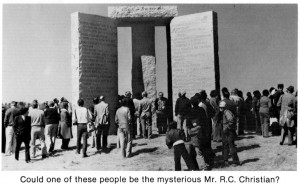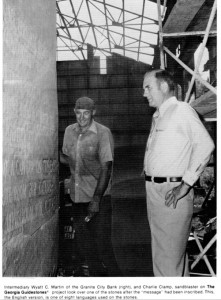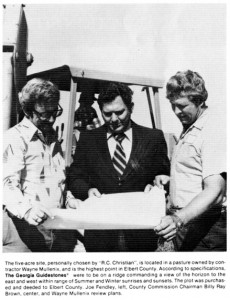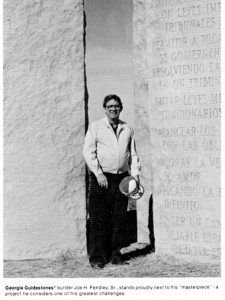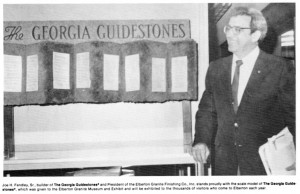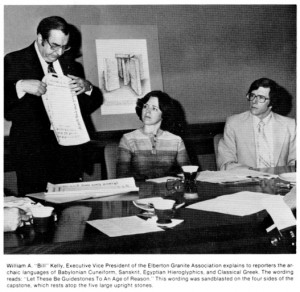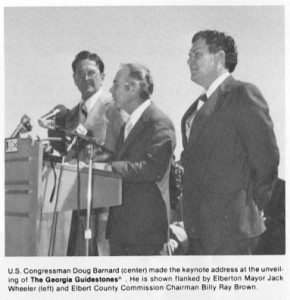BLOG: R.C. Christian and the GA Guidestones
November 8th, 2011 by bradsears@gmail.comThe answer to the question “Who created the Georgia Guidestones?” – like many aspects of the monument – is both answered and not answered by the Guidestones themselves. “Author: R.C. Christian” is engraved on the structure and yet there is also included the qualification that the name is a pseudonym. What is known about R.C. Christian? Let’s start with the official story provided by the Elberton Granite Finishing Company’s 1981 booklet.
The official story offers a number of facts about the Christian figure. There are quotations supposedly from the man himself along with comments from Joe H. Fendley, Sr. and Wyatt C. Martin – the only two people who have met R.C. Christian, while Martin is the only person who knows for sure his identity due to his position as the intermediary who handled the financing. Christian apparently stated, “I only use that name because I am a follower of the teachings of Jesus Christ,” while the description of the group – unattributed as the belief of the author or information given by Christian and/or his group – assures they are “small group of perhaps half-a-dozen people who believe in God and country” and for whom Christian is merely the “visible spokesman”. Apart from his religious belief, Christian is described as having “served in World War II and described himself as ‘a patriotic American in every sense of the word.'” Obviously a man of great wealth, he also “appears to be a well traveled and intelligent man” whose travels in Europe “impressed [him] with the many monuments throughout the countries” that naturally includes Stonehenge. Not to be confused with being too highfalutin, we also learn his “great-grandmother was originally from Georgia” and “he said he once was a concrete worker”. If it hasn’t become apparent in my writing, this description could not possibly be any more carefully constructed – a balance that keeps the monument and the R.C. Christian as above board as possible with the local crowd, for whom the entire message may seem to be – and does become seen as – an-anti Christian, anti-American promotion of a New World Order. To some extent this can be understood as a valuable position for whomever created the monument and why the Christian pseudonym was taken, but also as much serving the interests of the Elberton Granite Finishing Company. It is otherwise irrelevant, whether the information is true or false.
Christian is described as elegantly dressed, grey-haired and approximately middle-aged. He delivered the monument’s specifications in meters and was not deterred by the high estimate for the cost of creating the Guidestones. When the monument was built, despite supposedly standing in for a small group of concerned citizens, he is given credit as the author of the ‘text’. Because this is a pseudonym, it does provoke the spectator to investigate the question of who created the structure, but it is also somewhat self-centred. This is confirmed by the creation of Common Sense Renewed, a book written over five years after the monument was erected and for which R.C. Christian is again the author. In the book he takes full responsibility as “the originator of the Georgia Guidestones and the sole author of its inscriptions.” In fact, one function of the monument was to “inspire” other enterprising individuals to build twelve further Guidestones, but this has yet to occur. It would seem this particular venture is the passion of but one person, or perhaps he is the only one seeking to advertise this belief.
In Randall Sullivan’s well-circulated article on the Georgia Guidestones for Wired, it is revealed that Christian kept in regular contact with Martin: regular letters and occasional meetings in Athens, GA. The last point of contact was close to the events of 9/11 and Martin assumes, based on age, that Christian might now be deceased. In their meetings, Christian never discussed the books and the well kept contact with the only person that knows his identity indicates a desire to perform the role of Christian to the only person for whom he could. They appear to be the actions of a man performing for himself.
However, there is still reason to believe there is some form of network behind him, specifically due to the message on the Guidestones and the writings in Common Sense Renewed. Van Smith, writing in 2010, offers a great run-down of the book, from which a few highlights presented here are sourced. The general thrust of the book, like the Guidestones, is to promote a “rational world order” that rules the globe by reason. Like many faiths, there is a belief that “each human being has a purpose,” but that it takes a single governing body to be blunt about which humans are more equal than others. This involves difficult positions on eugenics, controlling the amount of births, extreme Darwinism with regard to those who are ill or without money, voting restricted to those who earn more, etc. This is beyond the general concept of respecting nature when it comes to the question of population control, but rather a kind of individualism that comes from someone for whom success, health and privilege have always been known. Do these beliefs synch up with any of the concepts outlined in the official story? Christianity? American identity? Being a former concrete working member of the proletariat? Not particularly.
The message of these writings link up with the beliefs of Alice A. Bailey and her New Age movement, where Christ is worshipped along with other deities; the ‘Common Sense’ writings of Thomas Paine; and the secret truths of nature, man and social order associated with the Rosicrucians. Each of these offer a potential network that may represent the group for which Christian is the visible spokesman. The claim for sole ownership of the ideas in the book may simply be a smokescreen for when he later distributed his book to “several thousand political officials and shapers of public opinion throughout the world” – including all members of the United States Congress – in order to not seem like there is a specific organization’s programme at work, diluting the message.
All photographs from the Guidestones booklet produced by the Elberton Granite Finishing Company in 1981.
